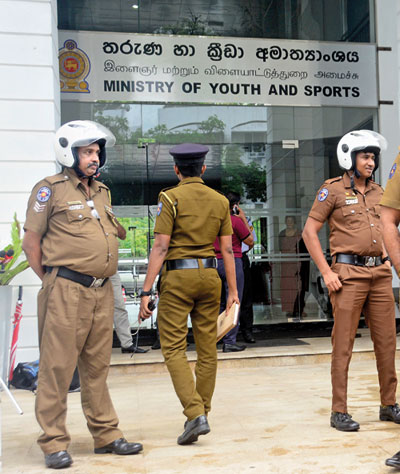Sports Ministry presents fresh set of regulations to all NSAs

The Ministry of Sports is supposed to be the local entity to oversee all activities of local sport bodies, but lately it has not contributed to the growth of sports in Sri Lanka
Sports Minister Sunil Kumara Gamage has rescinded all 38 regulations gazetted since October 27, 2016 as he has introduced a fresh set of regulations to govern Sri Lanka’s registered 74 national sports bodies, under the Ministry of Sports.
These rescinded regulations includes the regulations issued by former Sports Minister Harin Fernando in May last year which include a16-year term limit for all executive members but never received the parliamentary approval.
The new regulations, published in Gazette Extraordinary No. 2437/24 on May 21, 2025, are aimed at curbing corruption, improving transparency, and professionalising the operations of National Sports Associations or Federations across the island.
The regulations, titled the “National Sports Associations Regulations No. 01 of 2025”, considered a decisive response to long-standing issues plaguing Sri Lankan sports, including mismanagement, corruption, nepotism, politicisation, and a lack of accountability.
Under the new law, all National Sports Associations (NSAs) are now required to undergo a strict registration process. To even be considered for approval, associations must demonstrate active operations in at least three administrative districts, with expansion to seven districts mandatory within a two-year probationary period. Registration also requires submission of a detailed constitution, executive committee records, AGM minutes, audited accounts, and data on affiliated institutions.
The regulations include an extensive list of disqualifying factors designed to maintain integrity in sports administration. These range from criminal convictions and financial misconduct to conflicts of interest involving current players, coaches, or commercial activities related to sports equipment supply.
Particularly noteworthy are provisions addressing modern challenges in sports governance, including prohibitions on individuals involved in betting, match-fixing, anti-doping violations, or those who have failed to return to Sri Lanka after representing the country internationally. Politicians, media owners, and those linked to betting enterprises are also disqualified.
The regulations establish merit-based criteria for key positions, requiring candidates to demonstrate sporting achievement or professional expertise. Office bearers must have either represented Sri Lanka internationally, achieved podium finishes at national championships, or possess substantial professional experience in fields such as chartered accountancy, law, medicine, or engineering. Treasurers must be Chartered Accountants or hold equivalent financial credentials, ensuring competent financial management of sports associations.
To prevent the concentration of power, strict term limits have been implemented. No individual can serve as President, Secretary, or Treasurer for more than eight years total, while overall Executive Committee membership is capped at 12 years. Elections must be held every two years at Annual General Meetings, promoting regular democratic renewal.
Under these regulations, only 17 members should comprise of the Executive Committee, which include three vice presidents, including a vice president nominated by the respective school association and two women if the respective sports has women participation.
All NSAs are now mandated to conduct democratic elections through independent election committees in every two years to elect the governing body. The composition of these committees is determined based on the size and annual turnover of the association, with retired judges and senior election officials playing key roles.
Similarly, athlete selections for international representation must follow a stringent protocol. National Selection Committees, comprised of five members of former athletes and professionals, will now oversee all selections, which must be announced in advance and published online. Final lists require approval at multiple levels, including the Ministry of Sports.
No athlete may represent Sri Lanka without passing mandatory medical and fitness tests conducted by the National Institute of Sports Medicine.
In an effort to curb misuse of funds, the regulations stipulate that every NSA must submit audited financial statements to the Auditor General within two months of the end of each financial year. Associations are also required to disclose all foreign sponsorships and assets biannually and must return all documents, bank details, and data to new leadership within seven days of appointment. Associations that fail to conduct regular meetings or allow affiliated clubs to participate in events risk losing voting rights or registration.
The government has also taken steps to decentralise sports development, requiring federations to promote their respective sports across every Grama Niladhari Division. District and provincial sports associations must now organise regular competitions and training programmes.
In an inclusive move, all sports clubs for athletes with disabilities must be formally registered under the relevant national federations, including the National Paralympic Committee.
An independent five-member Appeals Advisory Committee has been established to address disputes arising from federation decisions, athlete selections, or election processes. Decisions made by the Minister of Sports on appeals will be final and cannot be challenged in court. Associations failing to comply with these regulations face severe penalties, including dissolution, financial sanctions, and bans from holding office.
National Sports Associations that have not held proper elections for 2025 are now required to do so within 90 days under the direct supervision of the Director General of Sports. Meanwhile, any association or affiliated body misusing the words ‘Sri Lanka’ or ‘National’ without proper registration will be deemed in violation of the law.


